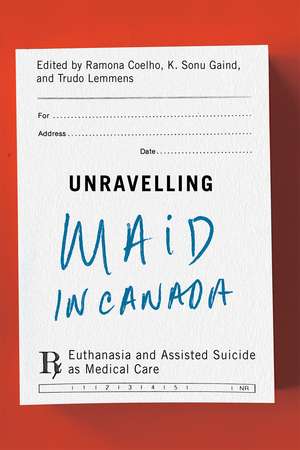Unravelling MAID in Canada: Euthanasia and Assisted Suicide as Medical Care
Editat de Ramona Coelho, K. Sonu Gaind, Trudo Lemmensen Limba Engleză Paperback – 22 apr 2025
Since legalizing euthanasia and assisted suicide as medical assistance in dying (MAiD) in 2016, Canada has witnessed an internationally unprecedented expansion of the practice, making it the country with the highest number of MAiD deaths. Initially introduced to relieve suffering in a broad end-of-life context, the law expanded quickly to make MAiD available to disabled Canadians not approaching their natural deaths. MAID will also become legal for sole reasons of mental illness sometime after 2027, and there are plans to expand it further to include minors and advance requests. From a cross-disciplinary perspective, including contributions from authors with lived experience, Indigenous perspectives, and expertise in medicine, mental health, disability, law, and ethics, Unravelling MAiD in Canada challenges readers with the ethical, medical, legal, societal, and disability justice rights concerns that have arisen in regard to this hotly debated irreversible practice. Canada now provides more state-facilitated euthanasia and assisted suicide than any other country. This volume puts forth critical reflections and valuable insights as more jurisdictions consider their own assisted dying laws and policies.
Preț: 224.14 lei
Nou
Puncte Express: 336
Preț estimativ în valută:
42.89€ • 44.31$ • 35.70£
42.89€ • 44.31$ • 35.70£
Carte nepublicată încă
Doresc să fiu notificat când acest titlu va fi disponibil:
Se trimite...
Preluare comenzi: 021 569.72.76
Specificații
ISBN-13: 9780228023692
ISBN-10: 0228023696
Pagini: 520
Ilustrații: 2 tables
Dimensiuni: 152 x 229 mm
Greutate: 0.45 kg
Editura: McGill-Queen's University Press
Colecția McGill-Queen's University Press
ISBN-10: 0228023696
Pagini: 520
Ilustrații: 2 tables
Dimensiuni: 152 x 229 mm
Greutate: 0.45 kg
Editura: McGill-Queen's University Press
Colecția McGill-Queen's University Press
Recenzii
“The subject of MAiD is more than a political or academic debate, more than a question of bodily autonomy and dignity – it is an existential threat to disabled people. Unravelling MAiD in Canada is a necessary book that analyzes this issue through race, gender, disability, and class. As MAiD expands to more countries, it becomes even more critical to document the history of these policies and their implications for the future.” Alice Wong, author of *Year of the Tiger: An Activist’s Life *
“This collection of essays educates the reader about the ethics, law, and acceptability of assisted dying as it touches on vulnerable groups. It will interest anyone concerned about the gradual extension of MAiD, especially to those groups whose architecture of choice continues to be effectively restricted. It broadens and deepens the terms of conversation about assisted dying. In setting polemics to one side, it is an indispensable reference tool for anyone who takes an interest in one of the defining issues of the early twenty-first century.” Gerard Quinn, former UN special rapporteur on the rights of persons with disabilities
“A reasoned, data-based, and multidisciplinary caution about the implications of providing state-funded assisted suicide to people with disabilities who are not dying, to those experiencing mental illness, to those who no longer have the capacity to consent to MAiD, and to ‘mature’ minors. Compassion for human suffering and commitment to ethical practice shine out from every page.” Elizabeth Sheehy, author of Defending Battered Women on Trial: Lessons from the Transcripts
“Unravelling the story of MAiD in Canada is a daunting undertaking. It requires untangling misinformation, distilling complex data, and examining issues from a multitude of perspectives. It also demands reckoning with what drives suffering Canadians to no longer want to live. With editors Coelho, Gaind, and Lemmens and their carefully selected coauthors, this task couldn’t be in more capable hands.” Harvey Chochinov, co-founder of the Canadian Virtual Hospice, co-editor of the Handbook of Psychiatry in Palliative Medicine, and author of Dignity in Care: The Human Side of Medicine
“Thorough analysis of data and a review of individual cases approved for ‘assisted dying’ with a critical and reflective eye are crucial. This book’s balanced approach sheds light on aspects often overlooked or avoided by campaigners. The authors clarify the profound challenges faced by those who are socially disadvantaged in societies that are increasingly ableist. Disabled individuals, and those whose autonomy is deeply constrained by poverty or illness, face the risk of being further devalued. The societal mechanisms and approaches revealed in Unravelling MAiD in Canada are thought-provoking – every caring physician, legal expert, and policymaker should read it carefully.” Ilora Finlay, Baroness of Llandaff, Cardiff University School of Medicine
Notă biografică
Ramona Coelho is a family physician in London, ON, and a founding member of Physicians Together with Vulnerable Canadians. She is a senior fellow with the Macdonald-Laurier Institute. K. Sonu Gaind is professor and governor at the University of Toronto and chief of psychiatry at Sunnybrook Health Sciences Centre. Trudo Lemmens is professor and Scholl Chair in Health Law and Policy at the Faculty of Law and the Dalla Lana School of Public Health, University of Toronto.
Descriere
“This book is exceptional. Coelho, Gaind, and Lemmens have edited a deeply informative collection that unpacks the history of medical assistance in dying in Canada and reveals its disproportionately harmful impact on persons with disabilities. The chapters helpfully bring together law, politics, medicine, and disability studies as they discuss and interrogate Canada’s rapid policy developments – developments that increasingly favour death in lieu of social supports, therapy, and palliative care.” Laverne Jacobs, University of Windsor and co-author of Law and Disability in Canada: Cases and Materials
